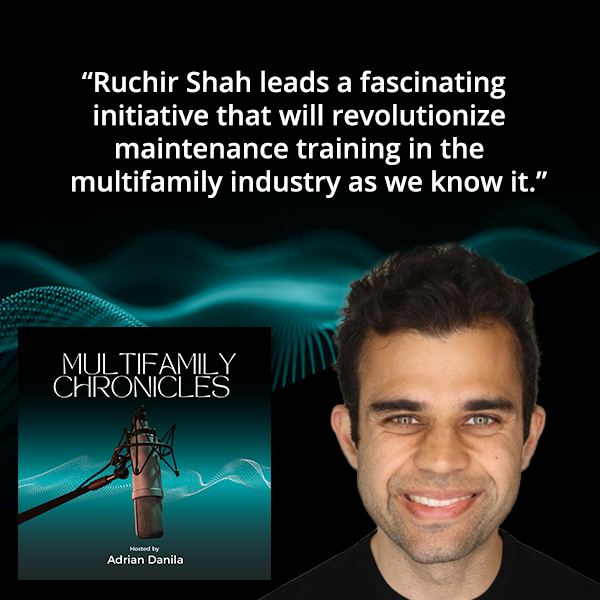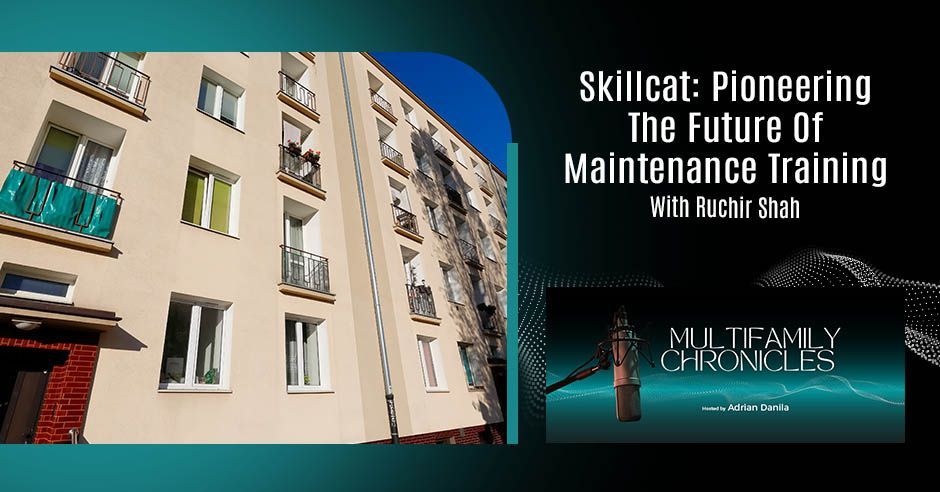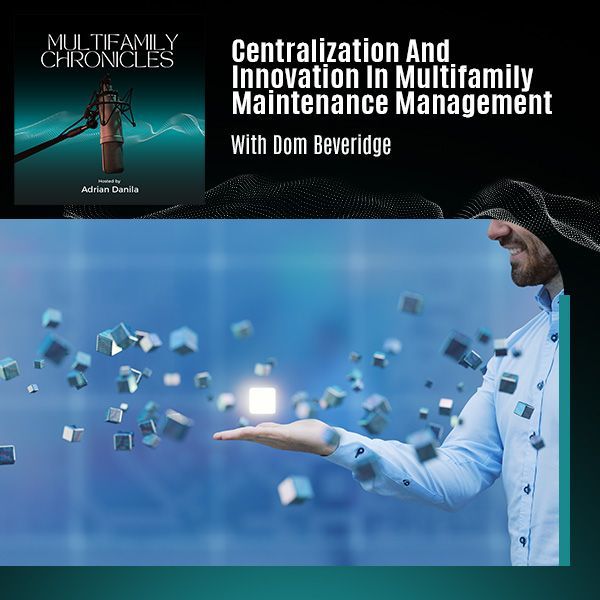Skillcat: Pioneering The Future Of Maintenance Training With Ruchir Shah
Embrace technology, bridge the gap, and empower the future of property maintenance. The future is bright, and learning is the key. In this episode, Ruchir Shah, the founder of SkillCat, discusses how technology is revolutionizing maintenance training in the multifamily industry. He introduces SkillCat's platform that uses simulations, animations, and real-time guidance to empower technicians to gain practical skills in a virtual environment. As he dives deeper into the platform’s features, Ruchir highlights the critical role of technology in bridging the gap between book knowledge and hands-on experience in property maintenance. The younger, tech-savvy generation is reshaping training methods and expectations in property maintenance, and it’s either we adapt or we miss out. Join us as we reveal the exciting possibilities of training in multifamily maintenance.
---
Watch the episode here
Listen to the podcast here
Skillcat: Pioneering The Future Of Maintenance Training With Ruchir Shah
In this episode, our guest is Ruchir Shah. Welcome to the show, Ruchir.
How's it going, Adrian? It’s great to be here.
Let's get you introduced to the audience. Please tell us a little bit about your background and then how you became a founder. Tell us your story.
Coming out of college, I went to school in Houston at Rice University. Coming out, I did policy research on the BP oil spill. I realized one of the biggest issues that caused that spill was ineffective training and training problems. I built a company right out of college. At 21, I was building online courses and simulators to train oil and gas workers. We grew that quite a bit. We had thousands of people trained and worked with a lot of the largest oil and gas companies.
I put that on hold for a bit. I went to business school at Stanford, came out of school, and went back to business during COVID. Every single oil and gas worker was being laid off. You had all these amazing skilled trade workers who had been making $300,000 or $400,000 a year going to work at grocery stores. They had amazing mechanical and electrical skills but didn't know where to go. What industries could use their skills? Oil and gas doesn't exist anymore at the time. What other opportunities are there for people like them?

That's when I decided to start SkillCat. I was building out a platform to help more people get into industries like HVAC, plumbing, electrical, and multifamily maintenance that have a huge shortage of technicians and can't find enough people who want to break into those industries. We built SkillCat as a training and jobs platform for folks who want to break into skill trade jobs. We've trained almost 100,000 people. These are people who have never worked in the trades and want to work in the trades. Also, a lot of folks who already worked in multifamily and maintenance, and want to grow, expand, and build their careers.
It's been an incredible experience. I was very fortunate. We live in a world where as a skilled trade technician, you can no longer plan to work at the same company your whole life. You can't even plan to work in the same industry your whole life. A lot of industries are evolving and technology is changing job roles. SkillCat aspires to be at the center of that journey for technicians. How do we help you adapt, grow, and build for the AI-enabled future?
If you were to pinpoint a number of a few pain points that SkillCat is solving in a multifamily industry, what would those be?
In short, it's the worker shortage. For those who don't know about this, there's a shortage of millions of workers across the skilled trades. Historically, people used to go to high school. It’s very common to go to a trade school, get a skilled trade job, and work as an HVAC technician, plumber, and electrician. They do great jobs.
Over time, our society and schools have tried pushing everyone to college. It's one of the biggest tragedies of our time that so many people who would be perfect fits for a maintenance job or a skilled job where they can make incredible money with 0 debt, instead end up going to school for 4 years, have over $250,000 in debt, and then go on to make $40,000 a year in a salary.
There is a huge problem where fewer people are joining the trades and a lot of Baby Boomers are retiring. Multifamily maintenance is one of the biggest ones. The average age of folks is 60 plus. When you have that, you have people retiring and fewer people joining the trades. One of the biggest challenges in multifamily, and it's often ignored, is there's a huge shortage of maintenance technicians.
Due to that, jobs don't get done as efficiently. A lot of companies are forced to outsource a lot of their work orders and pay massive sums of money to external contractors. Residents are less happy because their work takes longer to get fixed. There are a lot of challenges. At SkillCat, we have two different methods we've used to solve this huge problem. There are not enough workers in the trades. We have a hiring platform and an apprenticeship program where companies can work with us to bring on technicians from our platform who are some of the best and brightest minds who want to break into the industry.
We get them trained up, assess and vet them, and then we get them placed out. We can help source and assess great technicians. We also have training and tools that technicians can use to be more efficient and productive on the job. With our training and on-the-job troubleshooting tools, techs can become a lot faster at solving problems in the field. We’re doing what we can to bring more workers in to help retain them more effectively and then help make them more efficient and productive so they can do more with less.
The number one controllable expense in multifamily is maintenance-related expenses. How can technology help reduce those expenses?
It’s that first insight you mentioned there. The number one expense that's controllable is maintenance-related. I wish more operations managers and chief operating officers thought that way. Everyone thinks, “Maintenance is a cost center. You can't do much about it. Let's focus on leasing and revenue.” It's ridiculous. Many maintenance expenses can be cut through the proper use of technology and training. It comes down to the same thing. Hiring maintenance tech and retraining maintenance tech is expensive. If you can retain technicians better through technology that shows them a clear career path to growth, that saves money right there. That’s number one.
Number two, companies spend a tremendous amount of money outsourcing to HVAC, plumbing, and electrical contractors. We work with HVAC contractors too. They are very expensive and they're getting more expensive every day because they also have a worker shortage. Anything your maintenance X can't do in-house that they might be able to do is a wasted opportunity to save thousands of dollars.
I've talked to maintenance departments at multifamily organizations where they outsource filter changes. They'll call an HVAC company to change filters on AC units at their apartments. Often, HVAC companies charge $1,000 to come out there. For something as simple as a filter change that anyone should be able to do, they don't trust their maintenance technicians enough to do them because they haven't given them the training. They haven't empowered them and supported them to do that in-house.
There's a lot more that every single multifamily company can do to bring those expenses in-house and save a lot of money. I'm glad this show exists, Adrian, and that you're talking to so many people because more people need to understand that. I went to business school. It's stupid to say, “We're going to ignore this massive expense that's upwards of 50% of our operating budgets at times because it doesn't seem like we can do anything about it.” You can. If you have a $100,000 net operating income, making $20 more because you saved $20 in maintenance costs is a lot easier than making $20 more in building an entirely new apartment or leasing more effectively.
I'm glad you're mentioning how we get this through the CEO, top operators, and the executive's ears. Here's what happens and the biggest challenge. The biggest challenge is you have to get the message through and show how much value you are providing by using technology and cutting costs. Multifamily pricing has been on an upward trajectory for many years.
I can relate to that as an apartment renter for many years.
I'm sure you can. The prices have been going up and the value of real estate, especially multifamily. What's happening is everybody that's in a top position has a very good business. They're purchasing apartment complexes and communities and making a lot of money for themselves, their investors, and everybody. There's no real incentive to say, “Why don't we just make more money?” There's so much money to be made by owning the asset and operating it at a decent capacity that they're not interested. We're making enough money this way.
With a recession that is being announced, when something is going to happen in a market and the market is going to go down, it's going to readjust, there are very hard times for operators. We haven't had hard times for operators since maybe 2009. That's a very long run, in my opinion. It’s probably the longest in history. Typically, the cycles are more than five years. Most of the people that are in the industry haven't even been around in 2000. Imagine that. They don’t know what it's like.
When does the next one is going to come around? Probably soon. I don't know what to predict. This is when the best operators are going to make the best of that buck and situation. That's when they're going to be forced at maintenance beyond an expense. They are going to look at opportunities for the business to do better. I don't think that up until we hit some bottom and we go down, you're going to get a lot of interest from the operators that way. They're making enough money anyway so why bother? Do you disagree with this?
That's a great point. Think about this stuff in advance. Organizations that are efficient and productive are going to thrive when the economy struggles. Everyone will care a lot more about this when the economy is suffering more and multifamily is no longer up all the time. It takes time to train people. It takes time to hire and build that buffer. The smartest companies are thinking ahead. They're realizing that this is coming, trying to start planning, and preparing for it.

In your opinion, what are some key challenges faced by newcomers entering the apartment maintenance field? How can a training app or resource help them?
We see it again in multifamily. It’s leasing training as an obsession. It's good. I'm sure leasing is a tough job because you have to sell. Sales are always tough. We've talked to so many companies and these bright regional property managers or L&D teams where they're like, “We built out a tremendous number of courses focused on leasing.” That's great. Leasing is challenging but maintenance is hard. You're getting a lot of these entry-level people with no previous background working electrically or mechanically. You get a lot of millennials and below who don't have that much experience working with their hands.
It's tough to get into a maintenance job, especially an entry-level maintenance job without any training, guidance, or oversight. Often in a lot of these units, you might be the only person working to handle your apartment community. You don't even have an easy supervisor or service manager to watch over you and constantly ask questions. It's tough.
I can't imagine there are very few other jobs outside of multifamily maintenance where it's considered okay to throw someone into a pretty challenging job with no training. Having training, tools, and resources where you can easily get help and support is critical. It's essential for technicians to feel empowered, happy, and grow to improve retention and also to make home resident residents happier. They have technicians who know what they're doing. It's critical.
It's difficult to get the message up to the top. I'm going to ask you a point of question. Do you see any value in companies like yours or any tech company partnering with industry influencers or people who already have an established brand to help them spread the word, do a marketing campaign, or create awareness of the value of the services that they're offering? Do you see any type of value in that type of partnership, increasing your company brand's visibility?
Absolutely. Multifamily is a pretty insular industry. You come in as an outsider. You can go to NA and these conferences but everyone's like, “Who are you? Why have I never heard of you before?” Coming into multifamily, we had already worked with thousands of maintenance technicians on our platform. Every major company has had technicians on our platform but getting from that technician level up to an operations level is challenging. A lot of operations folks hadn't heard about us.
For us, influencers have been tremendous. I'd like to point out that Adrian, you've been incredible in helping push a message and sharing about this big problem in the trades. Influencers can be tremendous in supporting and guiding companies into the industry. It's not just lending credibility and brand. It's also understanding the industry better because it's such a mystery for someone coming in who doesn't understand how it works.

Something that I'm seeing typically at tech companies is they're hiring two types of people, people who could write code so they could build a product and people who could sell a product. That end-user experience is not part of the business. When you think about it, it's important to get a message up to the top but for this experience to be a very successful one and long-lived, you have to have a decent adoption rate at the end-user level, the person who's using the app. You might make a sale and say, “We sold this to 50,000 units.” This is an amazing sell because it is.
If you're turning around and hand this to the end-user and they're not using it, or they use it and they hate it, it's not going to be successful long-term because sooner than later, your client is going to realize, “We invested all this money into the app and it's not giving us any results.” People hate to use it. Any tech company that's out there that's building tech for maintenance should include people who could articulate what the issues are, what's working, and what's not working for real-life feedback so the product could be built around that end-user experience, not just how we think it should work.
That's where we've been able to shine, even though we're still early in multifamily. Before we ever started charging for our app and working with companies, we trained over 100,000 people, individual technicians who wanted to learn more and break into the industry. Once you've dealt with 20 angry individual users who are at home trying to make an app work and they're in their 60s and they're struggling, you can deal with anything. You build all of that into the app and the ecosystem. There's been a lot of long nights of dealing with support issues that have led to our app being so easy to use.
Let's say from adoption rates. To improve work efficiencies, how important are KPIs in measuring the effectiveness of tech solutions?
It’s extremely important. A lot of times, people bring on solutions like training or in-the-field tools. They sit on a shelf. The company buys them and they pay for them. It's a resource. Nobody knows if anyone's using it. Nobody cares. This is another resource for them. How does that help anyone? Unless people are using it, it has no value at all. KPIs matter a lot, KPIs for usage and also for success. Before we implemented this solution, we would outsource X percentage of HVAC work orders. Now, we outsource 10% less. We've had those results from some of our customers. It's necessary.
Unless people are actually using the solution, it has no value at all.
How do you believe someone unless you see evidence that that's the case, especially in your organization? It's almost like if you're not using our product, you shouldn't be our customer. Either you're not the right customer or we need to improve our product. We try to do everything month to month with our solution. It’s never even annual pricing. If you're not happy, leave. We learn something and we can improve our product accordingly.
How long, in your opinion, does the company need to use an app program to be able to extract enough data points to tell a story of the lack of effectiveness? How lengthy should that timeframe be? Is it 3 months or 5 years? Is it enough to build enough data points to tell the story and measure the efficiency of a tech product?
My feeling is you should always be testing. A good parallel to this is hiring. We spent a lot of time on the hiring side. If you're hiring someone new to your organization, before we hire them, we give them a work sample. They spend a couple of hours and we see, “Are you good enough to pass this work sample?” During their first week on the job, we give them some more tasks that are a little bit more complicated. “Are you good enough to do this?” A couple of months later, we gave them something more complicated. “Are you good enough to do this?” It's a process of gradually testing out hypotheses to see if something works well enough.
From the software perspective, there are some KPIs that you can test out before you even buy a product. There are some things you can test out in the first month and some things might take 90 to 60 or even 1 year. It varies but you should always be testing incrementally as you grow. For example, for our product, usually, a lot of companies start with a pilot.
You should always be testing incrementally as you grow.
It's 30 days and you get an opportunity during that time to test out whether people using it. Are people engaged and enjoying it? Are they interactive? 3 or 6 months later, they're using it. Does this have an impact on work orders or retention? Retention might take a year to test. Each one of these things takes different levels of time. You start with the KPIs, test as much as you can test as quickly as possible, and then go from there.
Ruchir, what are some effective ways to successfully roll out new technology in mid-size companies, maybe 20,000 or 30,000 units?
Pilots work well. As much as possible, start with a smaller group. Don't start with everyone. Start with some of your most engaged technicians and managers. Get them going and then grow from there. Pilots have worked pretty consistently for tech companies across industries. Multifamily is very much built for that because you're already distributed across different regions and buildings. Our experience so far has been pilots are the way to go.
You're speaking my language here.
Have you worked with a lot of pilots?
I am a proponent. I'm a big fan of pilots. I've seen it done the other way around. It's extremely messy and painful. No company should go through a painful process of implementing technology. Take your best operators who will be your end-users and test it on those operators. They even have to give you feedback and tell you what they like and don't like about the technology. It could go back to the manufacturer and the company that produces that tech and say, “We have these concerns.” They could hopefully address them for you and make the product better before you roll that out in mass.
It's frustrating how you described it. If something gets rolled out without a pilot, it can be frustrating for the multifamily company. It's also super frustrating for the tech company because yes, you may get more money upfront and have this great sale but then that company will eventually churn when they're unhappy and don't like your product. They won't use it as much. They won't have as good of an experience. Across the board, pilots work super well to validate on both sides how to make this a successful partnership.
They're the way to go. Once you get that adoption rating into the top users, they could also become ambassadors for you, make the case for you, and say, “We enjoy using this.” In all honesty, if the top performers are going to take a tech product and hate it, what's the whole point of selling to the whole company for it to turn into a mask and also damage your reputation? Honestly, we're a very large industry but we're a very small world where everybody knows everybody. The last thing that you want to hear about your product is that people talk about your product sucks. How do you envision the future of trading and skill development in property maintenance, Ruchir?
These industries are changing. If you look years ago, you could work in the same industry or company your entire life. For the most part, you wouldn't need to adapt that much. There might be some new products here and there. You need to learn maybe some new appliances, maybe some advancements that you need to figure out. For the most part, you learn once when you first finish school, maybe through an apprenticeship. You don't need to do that much ongoing learning for the rest of your career.
We're in a very different world. There are 2 or 3 big trends. One is electrification. The other is AI and automation. The third is the worker shortage. In electrification, you're seeing more appliances and everything. I've heard a lot of plumbing also going electrical. Everything's going electrical. Control systems are being engaged and incorporated everywhere. You have more units coming out every few months with new models. They're all more electrified. Unless you continuously and consistently learn, you're going to fall behind. You can't be in a complacent mindset where you don't keep learning and growing.
Unless you continuously, consistently learn, you're going to fall behind. You can't be in a complacent mindset where you don't keep learning and growing.
At the same time, with automation and the advent of generative AI, and a lot of movements in the AI and automation space, a lot of these jobs are going to change considerably. The maintenance technician of today is going to be different from the technician of 5 years and 10 years. The jobs will still exist but you're going to be using software more and leveraging a lot of tools.
In the future, training is not going to be something you just do once and then never do again, or you do once in a while and then that's it, or you do it to make your manager happy. It's something that technicians need to start doing consistently. Make it part of your routine every week or month to constantly go through, learn, and stay up-to-date on what's going on.
That's where technology like an app or a learning system can be useful. They make it straightforward to continuously and constantly learn. Nothing replaces hands-on training and getting experience on the job. When you're strapped for time and teams don't have enough resources, you need to look at technology to be rapidly learning and growing on a constant basis. Continuous learning is something that can be enabled through technology.
Ruchir, you mentioned AI. Everybody's talking about AI. There are concerns whether valid or not that AI is taking over the world and the jobs are disappearing because of AI. What's your opinion on AI? Is it eliminating jobs and are people going to be left in the streets because of the AI? Is it the opposite or a combination in between?
It's the opposite. It's interesting. If you look at technology, every time there’s a new technological development that's big, everyone's terrified about their jobs going away. It happened when computers came out, cars came out, and the internet started booming. What you see time and time again is jobs do not disappear. They just change. This is when we started SkillCat, we looked at a lot of the data. Typically, in the US, the average income of non-college-educated men, historically skilled trade workers, has gone down significantly since the ‘80s.
Someone could look at that and be like, “All the jobs are disappearing that are good skilled trade jobs.” That's not true. For every job that disappeared in manufacturing that was pure manual labor, it got replaced with a job that was a little bit more skilled in manufacturing and required more knowledge of controls in software.
Jobs are going to evolve. They're going to require new skills and insights and are probably going to be more interesting. A lot of the most boring, repetitive aspects of being a technician may get eliminated but there'll be more unique, thoughtful, and interesting jobs that emerge as a result of AI automating those components. Technicians and companies should embrace AI. You don't have a choice. It's coming anyway, whether you embrace it or not. If you embrace it, you have an opportunity to evolve your job and role for these new roles of the future.
The human race has a peculiarity. We see this in a history repeating and you mentioned when the car was invented. I go back to the industrial revolution, the steam engines, and all of that. The scare keeps coming back. We're not taking the time to read history to understand it. Change is going to happen. We always want the latest iPhone and everything but we don't want to become the latest version of ourselves.
We want the latest version of ourselves to be ourselves years ago. Back when I was in high school, for me, it was more than several years. It's not possible. I'm 40 pounds heavier. I'm getting old. I can't stop that. That's the nature of things and the way nature works. Why should we expect things to stagnate when it comes to jobs, technology, and evolution?
It's exciting. Everyone gets scared thinking about how their jobs might go away but there are new jobs that emerge with every single technological shift. I'm not worried.
In terms of knowledge and expertise, what gaps do you believe exist in an apartment maintenance training landscape?
It varies a lot. We sometimes come across companies that have built exceptional programs where they systematically teach people, grow them, and train them. Some companies do nothing. You posted something on LinkedIn about this where companies are like, “We got someone their EPA,” and that's it. They're trained maintenance tech. That's not how it works. We offer EPA certification through our app. A lot of people take it but that doesn't teach you how to be a maintenance tech that keeps you certified so that you can work with refrigerant. The actual on-the-job skills don't teach you any of those. Even for an HVAC tech, it doesn't teach you any of the on-the-job skills.
It's the actual tactical training that you can use to do well at your job like each work order one by one. We've gone through a bunch of companies we've worked with and ranked all of their work orders based on their frequency. What work orders happen the most often? Which ones do people struggle with the most? Real good training is applied and says, “Here are some concepts you can learn but then here are the work orders you're going to see, the issues, and the most common ways you can troubleshoot each one of these issues. Here's how you solve each issue. Learn it and then do it.”
It's tactical applied learning. There's a preponderance of safety training. We've seen a lot of companies, especially L&D teams, that say, “We care about safety for our technicians,” which is great. Where we see the biggest gap is actual on-the-job tactical training that can stop you from needing to call in external experts all the time.

Could you discuss any innovative teaching methods or approaches you think could revolutionize how technical skills are taught?
One thing that we try to do a lot in our courses is a lot of multimedia. Animations and simulations. There are a lot of concepts, especially when you're troubleshooting, that are hard to visualize because they're happening in the background. A lot of electrical stuff is happening in the background. You can't see it. You don't know what's happening. Animations that create a 3D representation that shows current and things moving in the background help people understand and visualize a lot of these concepts better.
Simulations are gamified games in a sense where you go in and solve problems and challenges as if you're playing a video game. You get a lot more practice than you would in real life and you can go again and again and see different issues. We found that useful, both on the technical side and also on the customer service side with simulations where you interact with customers, and have to deal with some of the different challenges that residents would face.
The third thing that we found interesting is tools and what we call real-time training or guidance. You always have your technicians or rock stars who go through training religiously day in and day out, read everything, and read manuals back-to-back. The number is increasing as we have to hire a lot more people who aren't that good at learning. They don't like going through training. One of the reasons they became trade technicians was that they didn't like school that much. There are technicians like that. What we've launched and seen in some other pretty neat companies in the industry launch are tools for text to use on the job.
When they go out to a work order, they’re like, “Watch this quick video. It’s 1 minute or 2 minutes long to refresh your memory of how to fix this. Here's a step-by-step chart or a troubleshooting flow that you walk through. Look at this picture and compare it to what you see. Does it look the same or different? Use that to make a decision when you're troubleshooting.” They’re making it a lot easier for techs to learn in real time when they need it in the field. Everyone wants to train and you need that to make that successful. Animation, simulations, and in-the-field guidance training are the three big areas that I see revolutionizing training.
How do you foresee the integration of digital tools impacting the overall quality of maintenance services in the apartment industry?
It will help a lot. That's what we're all about. It will have a tremendous impact. It will save organizations money, make everybody happier, and lead to a much more positive win-win for everyone involved in a multifamily organization.

I'm going to share some experiences. I hire people who are right out of school. They want to study HVAC. They went to a technical college. 6 months or 1 year later, they graduated. They came into the field and we hired them. When it comes to real-life knowledge, they know nothing. You have the book knowledge right here they spent quite a bit and they did some lab work too, for sure.
You have the real world in which you are expected to solve people’s problems and make an AC work, appliance, electrical circuit, or component. You have technology that's sitting right here in between. Explain to me how technology bridges that gap between book knowledge, theoretical knowledge, and hands-on knowledge. Is there enough hands-on knowledge to give the person the ability to execute successfully?
From the beginning, there has been some skepticism about online training. What can you do and learn online? There are three routes we've taken to address that concern and get people real applied hands-on experience. 1) I've mentioned simulations. They're not the same as getting hands-on experience. The more you have to think and do yourself instead of just watching, the more interactive you're forced to be. The closer it gets to hands-on experience. You feel a lot more comfortable and confident when you get out in the field that you know what everything is and what the process is to do something. Compared to traditional classroom learning, simulations go a long way.
2) How our app is designed. When you start your first year on the job, you get a career path that your company assigns you in the app. It includes badges that you can earn that are skill badges going through our training. It also includes badges you can only learn in the field. When you go in the field, let's say it's your first time changing a light bulb, a very simple example, or changing an AC filter. You take a picture, video, or audio clip off that task and upload it. Your manager can go in and validate that you have that skill. It's a way to gamify the process of gaining on-the-job skills using technology.
It's like, “I'm a technician level one. I just started. For me to get to a technician level two, I need to have gone into the field and done these fifteen different tasks that a maintenance technician needs to do. I should be able to do it on my own independently.” They go out and do those, take those pictures, take those videos, and build that portfolio so it empowers them. It makes you feel like you're growing. Otherwise, it can often feel like drinking from a fire hose in your first few months on the job. People quit because it's hard. They don't realize the progress that they're making toward their goal. Those on-the-job activities in our app help empower and quantify the growth of on-the-job training.
3) The tools. If there's real-time guidance that can help you in the field, you can throw an inexperienced technician, even someone on their first day on the job into solving an issue with an overflowing toilet. You can throw them in and give them our app and tool. They can do a pretty good job solving that with that tool. That empowers them. They might still have questions but they'll have fewer questions. They might still get demoralized but they'll be less demoralized. It helps empower them in real-time in the field. That's how we've thought about it.
Enhancing that experience is not making someone a genius overnight by carrying this app on their phone. It's enhancing. It's a resource. It makes their work life easier.
We've talked to a lot of companies that have terrible retention of maintenance techs. People blame this on the tech. They don't like hard work. A lot of technicians are dealing with an environment where they don't have the same mentorship and guidance that people who joined the industry many years ago had. They don't have the same luxury of taking time to train and do things slowly the way technicians many years ago had. There are much bigger shortages. There are a lot of fewer people in the industry. There's a lot less time. It's tough. You need these tools to keep technicians happy and supported. Everybody wants to grow and learn. They just need the right tools to get there.
Everybody wants to grow. Everybody wants to learn. They just need the right tools to get there.
Ruchir, how do you think the demographic shift towards digital native generations impacts the adoption and effectiveness of technology-based training in maintenance?
It helps a lot. It's interesting. We get a lot of young people on our platform. There are 100,000 young people. We also get a good number of old people. Old people struggle more. They call more with support issues and requests. A lot of them find mobile devices a lot easier than they find computers. A lot of them are still very intuitive and understanding of technology. As more Millennials and Gen Z enter the maintenance world, they’re technology first. They're not used to classroom training. Even in schools, people do a lot of their training online, in high school and middle school. They're used to doing everything digitally and gamified.
It’s one of the reasons we keep harping on simulations, career paths, and gamification. Even the generation ten years younger than me, we learn through games and technology. We grow up with a lot more gamification than any other generation. The more you can make things intuitive, make people feel like they're growing, and give people intermediate wins, you feel like you're winning every month, every week, or every day when you accomplish something, instead of only every year or every five years when you get a raise as some companies do. That's what helps keep people empowered. Being more exposed to technology is helpful. A risk there is that they want to see results, more recognition, and all of that in a way that other generations do not care about as much.
Ruchir, here’s a personal question about your experience. You are a founder of a company. I'd like for you to share with us a few things that you've learned from your experience as a founder and then maybe a couple of pieces of advice for someone who would like to follow the same path as you.
I worked for a year out of college in a job in finance. After that, I've been an entrepreneur pretty much forever. It's not something that's always been intentional. I haven't always gotten the jobs I've wanted. I probably would've been fired from my first job if I hadn't quit. It's not always a choice. It's empowering though. There's so much you can accomplish in this world. You can go after your passions in a way that you can't often in other jobs.
My advice is to take risks. At any age, people feel like, “I have so much going on. I can't afford to take a risk.” You're always the youngest you're ever going to be. It's always the right time to take a risk. Take risks and pursue your passions and dreams because you only have one life. You can always go back to a job. If you want to start something and you've been passionate about starting something, it never hurts. You should go for it. That's one thing I would say. The other is to surround yourself with great people.
You're always the youngest you're ever going to be. And so, it's always the right time to take a risk.
At SkillCat, I've been fortunate to have an exceptional team that's been with me since the very beginning. If you have great people around you, you can accomplish a million times more than you can accomplish alone. Entrepreneurship can be very lonely and challenging but if you have good people that you've surrounded yourself with, even the lows feel great because you know you can bounce back and you're with the right people. Those are two big things I've learned.
If anyone is thinking about an entrepreneurial journey, there's no time like the present. If you have a job and you want to start something on the side, go for it. There's always more time in the day. There are always weekends. When I was working my first job, I would go during my lunch break and cold call. I would spend the weekends calling and working on stuff. That's how people get started. Even if you have a job, start working on something on the side and then reach out to people whom you want advice or inspiration from.
I'll share my information with Adrian. If anyone wants any input on entrepreneurship, I'm happy to give some insights. Go and do it. It's a rewarding thing. I've had companies that have failed. Even if you've started companies that failed, you learn so much in that process and you come out better for anything you choose to do next. I strongly recommend it.
Ruchir, it was a real pleasure to have you here. We covered a lot. It’s a great conversation. I want in closing to allow you to say something that you wish you would've said and you didn't have the opportunity to say, or maybe just answer a question you wish I would've asked and I didn't.
Maybe shameless plug for SkillCat. We're building something exceptional that's going to change the way maintenance is done across multifamily. If you're interested in being involved or supporting our mission in any way, please reach out to me. We'd love to talk. I love feedback, ideas, and suggestions. We're excited about what we're building. We are looking for supporters who want to join the ride. Thanks so much, Adrian. I enjoyed it. This is so much fun. It’s my first show. I had a great time. You're a great host.
I appreciate it. You did mention people reaching out to you that they could. Tell us about a few ways in which they could reach out to you. How could they get ahold of you?
My email is Ruchir@SkillCatApp.com. You can send me an email there. You can also go to the SkillCat website and send an email through the form there. It will get to me. I would share my cell phone number but probably not the best idea on this channel. If you want my cell phone number, Adrian will give it to you.
Ruchir, it was amazing having you. Thank you again very much for coming here with us. Everybody, thank you for reading. I hope to see you back here soon.





